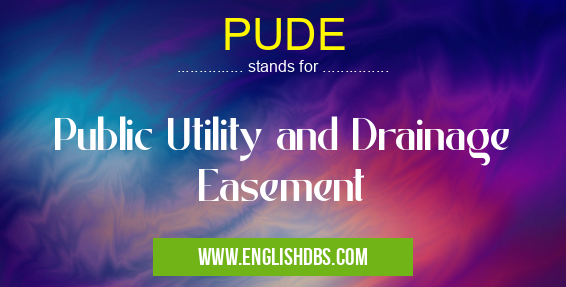What does PUDE mean in UNCLASSIFIED
PUDE stands for Public Utility and Drainage Easement. It is an acronym used to describe a legal agreement that allows utilities, such as water, sewer, electricity, and phone companies, to use or cross private property to access facilities or services. These easements are commonly used in areas with limited public resources or infrastructure and can benefit both the company and the landowner. This article will explore what PUDE means for everyone involved.

PUDE meaning in Unclassified in Miscellaneous
PUDE mostly used in an acronym Unclassified in Category Miscellaneous that means Public Utility and Drainage Easement
Shorthand: PUDE,
Full Form: Public Utility and Drainage Easement
For more information of "Public Utility and Drainage Easement", see the section below.
What Is a Public Utility and Drainage Easement?
A public utility and drainage easement, also known as a PUDE or PU&D easement, is an agreement between a utility company and private property owner that gives the company certain rights to use the owner's land for access and service purposes. The agreement typically involves granting rights of ingress (access) and egress (exit) over specific parts of the land in order to install or maintain underground pipes, wires, conduits, lines connecting poles, buildings or other structures related to their services. The exact terms of each servitude vary depending on local law but generally gives the utility provider permanent rights over specific parts of another person's land even if it changes hands multiple times.
Benefits of a PUDE
The main benefit of a PUDE is that it provides homeowners with basic services they otherwise wouldn't have had access to without it. By granting access to water mains, sewage lines, power grids, communication networks etc., these easements allow individuals living in areas with limited resources or infrastructure to still enjoy modern luxuries like running water or internet connections. In return for allowing these services onto their land many homeowners receive reduced rates on their bills which can result in thousands of dollars being saved over time. Additionally this can also help increase safety by giving firefighters easier access during emergencies should they need it urgently.
Another benefit is that because these agreements are legally binding they provide extra security for both parties involved ensuring that the utility provider can continue providing necessary services uninterrupted while also protecting landowners from any kind of unauthorized intrusion onto their property. It adds an extra layer of protection in case there ever needed legal action to be taken against either side due to breach of contract issues etc..
Essential Questions and Answers on Public Utility and Drainage Easement in "MISCELLANEOUS»UNFILED"
What is a Public Utility and Drainage Easement?
A Public Utility and Drainage Easement (PUDE) is an agreement between a local government or utility provider and landowners that allows the government or provider to maintain, repair and operate public utilities on private land. This includes water, electricity, sanitation, telecommunications and other public services. The purpose of the easement is to ensure that essential public services are accessible even when they cross through private land.
When does a PUDE take effect?
A PUDE takes effect once it's signed by both parties and approved by the local municipality. At this point, it becomes legally binding and enforceable in court if necessary.
Who can apply for a PUDE?
Any local government agency, state agency or publicly-owned utility company are eligible to apply for a PUDE. Private individuals may also be able to obtain one with written permission from their local municipality.
Who grants approval for PUDES?
Local municipalities are responsible for granting approvals for PUDES. They will review all relevant paperwork before making a decision on whether to approve the agreement.
How long does a PUDE last?
The duration of a PUDE depends on its terms and conditions as specified in the contract between the two parties involved. However, most PUDES last anywhere from five years up to fifty years depending on what was negotiated between both sides.
Is there an annual fee associated with having a PUDE in place?
Generally speaking there is no annual fee associated with having a PUDE in place; however fees may be assessed for any repairs or maintenance required during the duration of the easement’s term.
Does the landowner have any obligations when it comes to maintaining a PUDE?
It's important that landowners make sure their property remains compliant with all regulations set out in their respective PUDE agreements since failure to do so could lead to legal trouble with their respective state or local municipality. Landowners must also ensure that any repairs needed on equipment due to natural disasters are done promptly in order to protect the integrity of public utilities running across their property.
Does having a PUDE affect my property taxes?
Having an active PUDE should not have any direct impact on your property taxes; however certain indirect effects such as increased appraised values may come into play which could potentially affect your tax rate accordingly. It's best you speak directly with your local municipality about this matter further for clarification if needed.
Final Words:
In conclusion, PUDE stands for Public Utility and Drainage Easement which is an important legal agreement between a utility provider and private property owner that grants certain rights over specific lands for installation or maintenance purposes related to their services such as water mains, sewage lines etc.. Not only does this grant necessary services but also provides both pilots with extra legal protection in case anything irregular happens on either side making them highly beneficial agreements overall.
